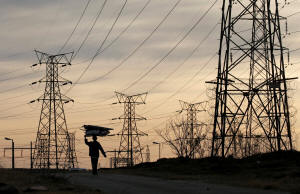Energy prices a 'major concern' for South Africa -Finance Minister
Godongwana
 Send a link to a friend
Send a link to a friend
 [April 23, 2022] By
Rachel Savage and Karin Strohecker [April 23, 2022] By
Rachel Savage and Karin Strohecker
LONDON (Reuters) - Energy prices that have
soared since Russia's war in Ukraine are a "major concern" for South
Africa's economy, Finance Minister Enoch Godongwana said on Friday,
while it was too soon to quantify the full impact of last week's
devastating floods.
Whether high prices of the commodities that South Africa exports,
including gold and platinum metals, would counter this was still
unclear, Godongwana told Reuters in a video call from Washington at the
International Monetary Fund Spring Meetings.
Inflation has risen worldwide after Russia invaded Ukraine on Feb. 24,
particularly food, fertiliser and fuel, with subsequent interest rate
rises by the U.S. Federal Reserve and lockdowns in China adding pressure
to the global economy.
"Energy prices are of major concern," Godongwana said. "Fuel prices are
pervasive in the economy - they push your food prices up... It is
becoming a more worrying threat."
He said interruptions to Durban port operations caused by floods, which
killed 435 people and caused at least 10 billion rand ($640 million) of
infrastructure damage in KwaZulu-Natal province, would limit the
benefits of commodity exports.
"It is still too early to estimate the impact of the floods on the
broader economy."

South Africa's rand had been among the best performing currencies in the
world this year, thanks to metal exports, but fell 7% this week in the
wake of the floods and severe power cuts that have long held back the
country's economy.
CHINA-AFRICA LENDING
The IMF meetings also focused on a lack of progress with the issue of
debt sustainability, Godongwana said, welcoming the "breakthrough" that
came with China's pledge on Thursday to join the creditor committee for
restructuring Zambia's debt.
[to top of second column] |

A woman carries fire wood on her head as she walks below state power
utility ESKOM's elecricity pylons in Soweto, South Africa, August 8,
2016. REUTERS/Siphiwe Sibeko

"China has been the one who has been slowing progress in relation to Zambia. I
don't blame them. Their approach has been... let's do it on a case-by-case
basis," he said.
Godongwana described China's approach to lending in Africa as "aggressive", but
said that it may have reached "saturation" both from its perspective and as
borrowing countries realise the loans are just as stringent as others.
Chinese bank financing for infrastructure projects in Africa fell from $11
billion in 2017 to $3.3 billion in 2020, according to a report by international
law firm Baker McKenzie.
"The reason China went case-by-case is that they are more exposed than any other
nation as a lender to the African continent," Godongwana said.
"And that suggests that it may have become a problem for China as a lender and
it is also becoming a problem for the recipients."
Godongwana said that in late May African governments would discuss changes they
wanted to see to the Common Framework, the debt restructuring process set up in
response to the coronavirus pandemic by the Group of 20 (G20) major economies.
"There's little uptake, which shows that there's some problem with the design of
the policy," he said.
Chad, Ethiopia and Zambia requested relief from the programme over a year ago
and have yet to receive any.
($1 = 15.6150 rand)
(Reporting by Rachel Savage and Karin Strohecker; Editing by Chizu Nomiyama)
[© 2022 Thomson Reuters. All rights
reserved.]This material may not be published,
broadcast, rewritten or redistributed.
Thompson Reuters is solely responsible for this content.
 |